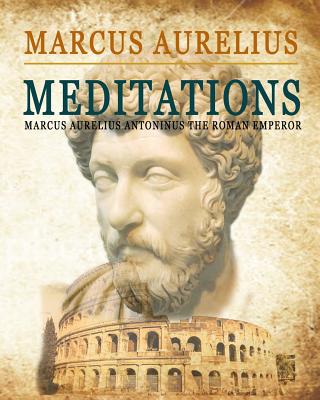Meditations: (Marcus Aurelius Antonius the Roman Emperor)

Meditations: (Marcus Aurelius Antonius the Roman Emperor)
Marcus Aurelius, emperor of Rome, may be the closest mankind has ever come to producing the philosopher king that Plato envisioned in The Republic. A reluctant ruler and a reluctant warrior, much of his reign was spent in battle, defending the frontiers of the empire from the "barbarian" hordes. Fortunately for us, he carried a notebook along on his military campaigns, and thus we have the Meditations. Marcus's writings reveal him to be the last and greatest of the classical Stoics. Stoicism is a school of thought that asserts we have no control over our lives, only control over our perceptions. It advocates that the best life is the life that is lived in accordance with nature (not "nature" as in grass and trees, but "nature" as in the order of the universe). By concentrating one's thoughts and choices on what is good and virtuous, and disregarding the unimportant distractions of everyday life (even life and death are said to be neither good nor bad, but "indifferent"), we can avoid negative emotions like fear, anger, grief, and frustration, and live a life of happiness and tranquility. That's an oversimplification, of course. If you really want to know what Stoicism is and how it works read Epictetus or Seneca. What Marcus provides us with are the reflections of a man who studied and lived the Stoic life, and was its ultimate exemplar. Even if you don't buy into Stoicism, or have no interest in Philosophy with a capital P, you can still find inspiration and solace in the Meditations, as Marcus instructs us in dealing justly with others, overcoming emotional hardship, living life to the fullest by overcoming the fear of death, and resigning oneself to the insignificance of man in the universe. The Meditations are divided into twelve books. Each book contains anywhere from 16 to 75 numbered paragraphs, ranging in length from a sentence to a page. The paragraphs are arranged without regard to sequence or subject matter. This haphazard method of compilation is really the book's only flaw. What the Meditations has always needed is a good index, but I've never found a volume that has one. It is a pleasure to publish this new, high quality, and affordable edition of this timeless book.
PRP: 45.00 Lei
Acesta este Prețul Recomandat de Producător. Prețul de vânzare al produsului este afișat mai jos.
40.50Lei
40.50Lei
45.00 LeiIndisponibil
Descrierea produsului
Marcus Aurelius, emperor of Rome, may be the closest mankind has ever come to producing the philosopher king that Plato envisioned in The Republic. A reluctant ruler and a reluctant warrior, much of his reign was spent in battle, defending the frontiers of the empire from the "barbarian" hordes. Fortunately for us, he carried a notebook along on his military campaigns, and thus we have the Meditations. Marcus's writings reveal him to be the last and greatest of the classical Stoics. Stoicism is a school of thought that asserts we have no control over our lives, only control over our perceptions. It advocates that the best life is the life that is lived in accordance with nature (not "nature" as in grass and trees, but "nature" as in the order of the universe). By concentrating one's thoughts and choices on what is good and virtuous, and disregarding the unimportant distractions of everyday life (even life and death are said to be neither good nor bad, but "indifferent"), we can avoid negative emotions like fear, anger, grief, and frustration, and live a life of happiness and tranquility. That's an oversimplification, of course. If you really want to know what Stoicism is and how it works read Epictetus or Seneca. What Marcus provides us with are the reflections of a man who studied and lived the Stoic life, and was its ultimate exemplar. Even if you don't buy into Stoicism, or have no interest in Philosophy with a capital P, you can still find inspiration and solace in the Meditations, as Marcus instructs us in dealing justly with others, overcoming emotional hardship, living life to the fullest by overcoming the fear of death, and resigning oneself to the insignificance of man in the universe. The Meditations are divided into twelve books. Each book contains anywhere from 16 to 75 numbered paragraphs, ranging in length from a sentence to a page. The paragraphs are arranged without regard to sequence or subject matter. This haphazard method of compilation is really the book's only flaw. What the Meditations has always needed is a good index, but I've never found a volume that has one. It is a pleasure to publish this new, high quality, and affordable edition of this timeless book.













